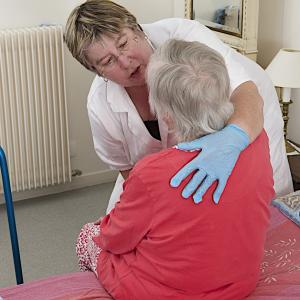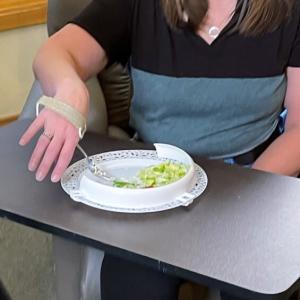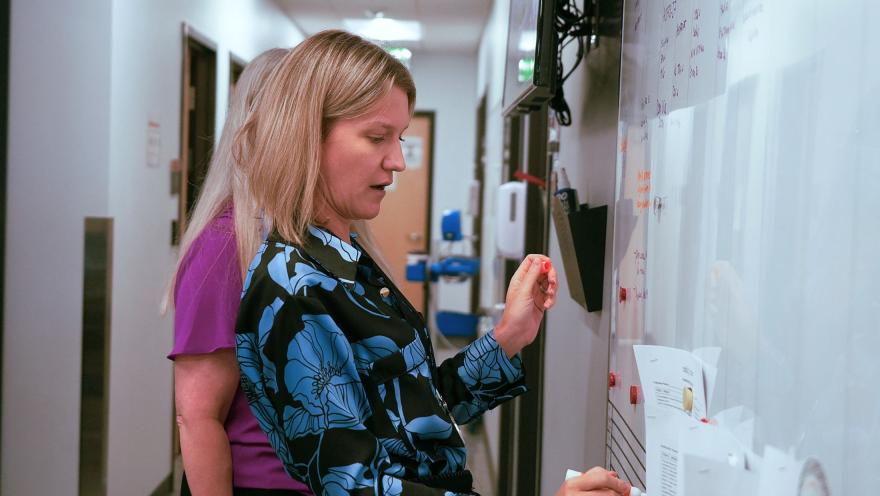The search for new treatments and a cure is vitally important to making ALS a livable disease, but we also know that the type of care people with ALS receive – and when they receive this care – affects survival and quality of life.
That is why we are committing nearly $2 million over the next two years to support research focused on optimizing the effectiveness, efficiency, and accessibility of ALS care. These are the first five projects funded through our new Quality of Care Research Awards.

“ALS is a devastating illness with profound effects on people with ALS as well as their loved ones. While we advance research on disease-modifying therapeutics, it is also critical that we work to improve other types of care – including symptom management, emotional and practical support for people with ALS and their care partners, care planning, and end-of-life care – in order to improve comfort, quality of life, and make the illness more livable,” said Dr. Kara Bischoff, a palliative care physician at the University of California San Francisco.
Dr. Bischoff received a 2023 Quality of Care Research Award to better understand the barriers that keep people living with ALS from receiving palliative/supportive care so in the future everyone with the disease has the opportunity to receive this specialized type of care when and where they want it.
The other projects selected for funding will focus on:

Improving Nutrition Care Practices in ALS through Education and Mentoring. Dr. Amy Ellis, a dietitian and assistant professor at The University of Alabama, along with her collaborators Dr. Keith Pearson and Stephanie Dobak, intend to create support systems, provide education, and develop resources specifically for dietitians who support people living with ALS. “We hope this project will lead to dietitians being better equipped and more confident in delivering excellent, evidence-based nutrition care to people living with ALS. Ultimately, we want to see both the quality of nutrition care being delivered by dietitians and the quality of life of people living with ALS dramatically improved,” Dr. Pearson said.
Respiratory Comorbidity Detection Using Digital Devices. Dr. Stephen Johnson, a neurologist at Mayo Clinic Arizona, is looking to see if an unobtrusive wearable device can be used to help diagnose and ultimately prevent complications of ALS, such as pneumonia and blood clots.
Improving Palliative Care Teamwork in ALS. Dr. Michelle Milic, an associate professor at Georgetown University who specializes in hospice and palliative care, plans to employ a three-pronged approach designed to identify and alleviate unmet suffering, mitigate distress, and elevate quality of life for people living with ALS, their care partners, and the health care team. “By focusing on the spiritual needs of people living with ALS, providing support to care partners, and integrating palliative care communication skills and reflection practices into the care team, this project aims to enhance the overall quality of life for people living with ALS and contribute to the scientific evidence supporting the benefits of spiritual interventions in health care,” she said.

ALS-Related Fatigue: Mechanisms and Interventions. Neurologist Dr. Lydia Sharp, an associate professor at Baylor College of Medicine, aims to identify the underlying causes of ALS-related fatigue to help inform the development of an ALS-specific fatigue scale. “Fatigue is one of the most debilitating and difficult-to-treat symptoms in ALS and can reduce the quality of life of individuals living with this disease. We hope this project will provide a tool to efficiently identify ALS-related fatigue in the clinic and eventually enable the development of targeted interventions for ALS-related fatigue,” she said.
According to the Association’s Chief Mission Officer Dr. Neil Thakur, working to increase the quality of ALS care becomes even more important as better treatments, technologies, and practices become available.


Comments
This is wonderful news! I am so grateful for these amazing researchers, doctors , scientists and staff who have the heart and ability to achieve this goal.
Join the conversation. Please comment below.